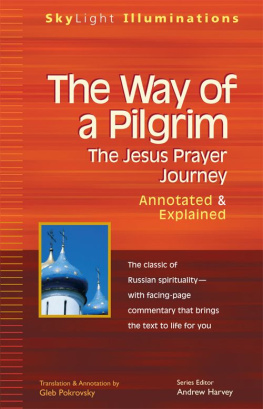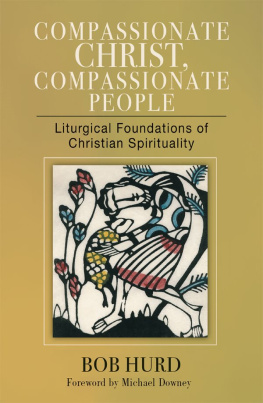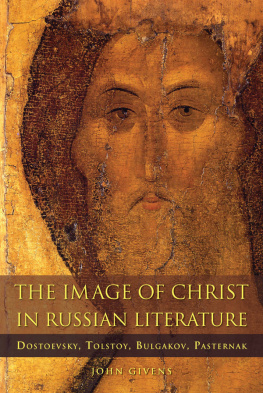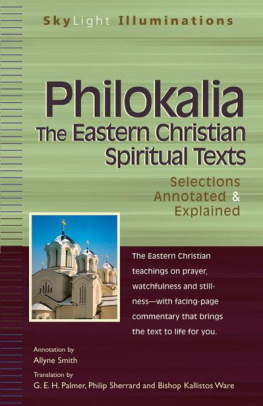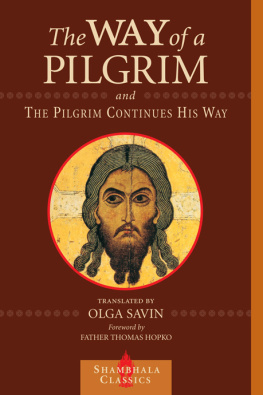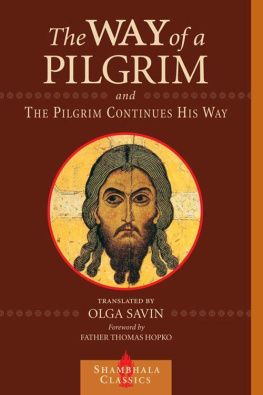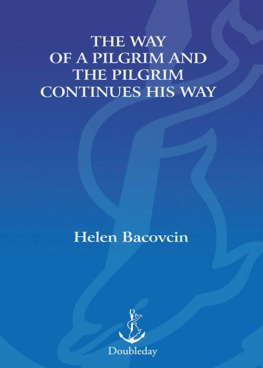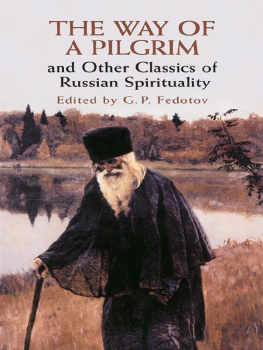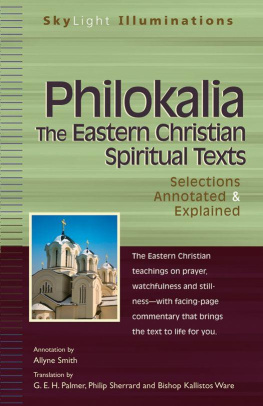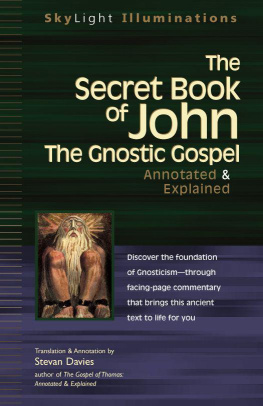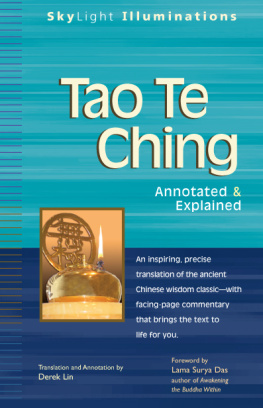

Thank you for purchasing this SkyLight Paths e-book!
Sign up for our e-newsletter to receive special offers and information on the latest new books and other great e-books from SkyLight Paths.
Sign Up Here
or visit us online to sign up at
www.skylightpaths.com .
Looking for an inspirational speaker for an upcoming event, conference or retreat?
SkyLight Paths authors are available to speak and teach on a variety of topics that educate and inspire. For more information about our authors who are available to speak to your group, visit or call us at (802) 457-4000.
Contents
The journey begins The pilgrim meets his starets Learning the Jesus prayer The wisdom of the Philokalia A summer of prayer The death of the starets
The pilgrims journey continues The prayer takes over Encounter with the forester A dream of the starets A job as church watchman The Old Believer girl Arrival in Irkutsk
The pilgrims story
Plans for a pilgrimage to Jerusalem A visit with a pious family The blind traveling companion An accident and its unexpected outcome Departure for the Holy Land
Sign Up for E-mail Updates
Send Us Your Feedback
Foreword
Andrew Harvey
Some books come to mean so much to you that you never forget the first time you read them. The first time I read The Way of a Pilgrim was over twenty years ago. I was then an academic, a fellow of an Oxford college; I had just returned to England after a life-changing year-long stay in India where, for the first time, I had become aware of mystical reality through a series of experiences I could neither explain nor deny. I came back to Oxford convinced that spiritual truth could only be found in India and the Eastern spiritual traditions, and that Christianity was finished and burned out.
The first person I imposed my new vision on was my best friend, Anne Pennington, a professor of Slavonic studies and a devout Russian Orthodox Christian. Anne listened patiently to my Indian raptures but cut me short when I started to dismiss the whole of Western religious experience. How can you judge the Christian mystical tradition by what you see in the contemporary church? she said. That would be like judging the entire tradition of classical music by the dissonant ravings of the latest so-called composer. When youre settled in and less stubborn, Im going to send you a book that will change your mind. And perhaps not only your mind....
The book she sent me was her own worn and annotated copy of The Way of a Pilgrim along with photocopies of her favorite quotes on the prayer of the heart from the Philokalia , the famous anthology of Eastern Orthodox texts on the spiritual life. It was a glowing, golden September, I remember: I took the book and the quotes out into a garden by the river and devoured them there in one sitting, transfixed and humbled by what I found. In India I had encountered for the first time the practice of japa of repeating the name of God in the heartand now I realized that in the Jesus prayer, Lord Jesus Christ, have mercy on me, the Eastern Orthodox tradition had made the same simple, all-transforming discovery of the power of the divine name. The ecstasies and revelations of the anonymous narrator of The Way of a Pilgrim were no less profound and poignant than those that had so shaken me in Mirabai, Kabir, and Toukaram, the great Hindu and Sufi mystics the discovery of whom had changed my life. And in the string of quotes from the Philokalia from figures such as Symeon the New Theologian, Isaac the Syrian, and Gregory Palamasthen totally unknown to meI recognized the pure sober note of mystical certainty and rigor that had thrilled me in the Bhagavad Gita and the Upanishads. A week later at dinner Anne and I discussed the practice of the Jesus prayer. I asked Anne what it meant to her. She paused a long time and then answered softly, Everything. Two years later when she was dying of cancer, still only in her forties, I asked her what was sustaining her faith and courage. The Jesus prayer, she replied. It gives me everything I need. After her death, I had a dream of her standing, flooded by divine light, by a statue of the resurrected Christ. She was gazing at me with immense tenderness and some amusement as if to say, And now do you at last understand how powerful prayer of the heart can be? In her right hand, she was holding the copy of The Way of a Pilgrim she had lent me.
Although it would be ten more years before I set about practicing the Jesus prayer seriously, I can now say with wonder and gratitude that I am beginning to know what Anne was so anxious to show me. There are many ways you can read this profound and glorious book that is one of the worlds religious masterpieces. Whatever path you find yourself on, you can revel in it as a spiritual adventure story, the account of a man who searches for the meaning of prayer and mystical truth and finds them on a journey peppered with colorful encounters, visions, and those revealing twists of fate of which any sincere seekers life is full. If you are a practicing mystic, you can read The Way of a Pilgrim as a skillful and wise presentation of the theory and practice of the Jesus prayer, taking to heart its instructions and precise advice, delighting in the many subtle ways it opens up to you the treasures of the Eastern Orthodox tradition. I have known Hindus who have been inspired to return to their own practice by it and Buddhists who have found in its pages deep confirmation of their own experience of meditation. If you are not religious at all, you can enjoy The Way of a Pilgrim as a brilliantly sensuous and pungent evocation of midnineteenth-century Russia, with its villages and mud roads, snowy wastes and vast virgin forests, and that all-rewarding atmosphere of religious passion that permeates Russian literature from its origins through the novels of Tolstoy and Dostoyevsky, right up to the modern works of Pasternak and Solzhenitsyn. One incorrigibly secular friend of mine, a Russian-born philosopher, once surprised me by saying, The three greatest books in Russian are War and Peace, The Idiot, and The Way of a Pilgrim. When I asked him why he had included the latter, he replied, Because it breathes the rich leather-and-incense perfume of old Russia with unique force. For myself, now, I find that the deeper and most satisfying way of reading The Way of a Pilgrim is as the unfolding of a profound mystical initiation into the ecstasy and truth of what Jesus called the Kingdom, that state of divine knowledge and love that reveals the world as sacred and all beings as inherently divine that is the true goal of the Christian life.
Many readers who come to The Way of a Pilgrim for the first time will find as I did, that it has a mysteriously initiatory power. The clue to this power, I believe, is that the work itself unfolds in the rhythms of sacred time and providence, with something of the same unpredictable and paradoxical simplicity of the Divine itself. This initiatory intent is stated early on: When the pilgrim meets the man who will become his starets , the old priest explains to him why his attempts up to now to discover the meaning of unceasing prayer have been unsuccessful: Until now you have been tested in the cooperation of your will with Gods calling and have been granted to understand that neither the wisdom of this world nor mere superficial curiosity can attain to the divine illumination of unceasing interior prayer. And the starets adds, making his meaning even more clear, On the contrary, it is the humble simple heart that attains to such prayer, through poverty of the spirit and a living experience of it. The entire remainder of the book unveils the radical deepening of the pilgrims knowledge of poverty of spirit and of the living experience of divine presence that interior prayer opens him to. From the pivotal meeting with the starets onward, everything that occurs to the pilgrim occurs in the rhythms of a secret providence that guides him through both exterior events and graded stages of inner self-revelation to an ever-more radiant awareness of the Christ-fire burning within him and in the creation, in all its tender glory. It is part of the works enduring magic that so profound a process should be unfolded in the simplest imaginable prose, with a directness of approach that mirrors the directness of Truth itself. It is this diamantine, Gospel-like simplicity that draws the reader into believing that what is revealed to and in the pilgrim could be revealed to and in herself.
Next page
